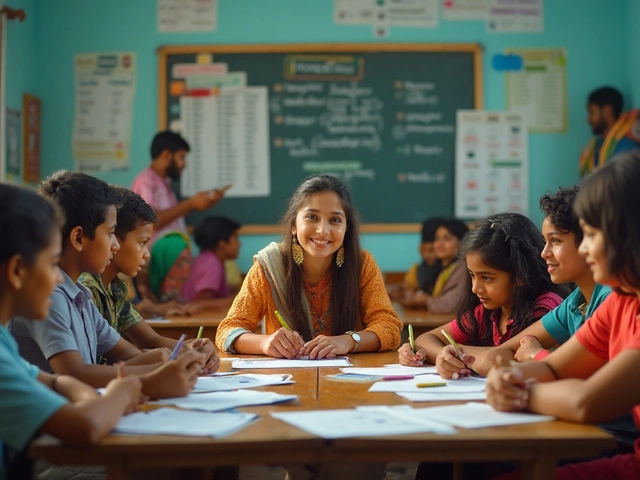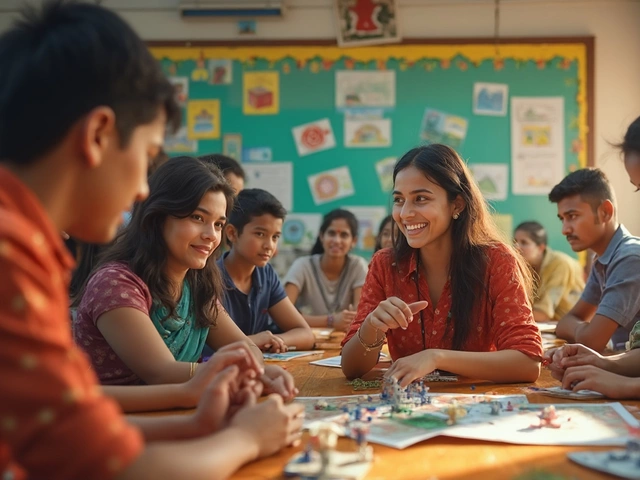Heard people say computer courses in India are tough? They're not kidding. But when you ask which one is the hardest, the answer comes faster than a coding bug pops up—B.Tech in Computer Science & Engineering (CSE). This isn’t just a random guess. Every year, thousands of students sign up hopeful, but only the resilient really thrive.
If you think it’s just a bunch of coding and some late-night assignments, think again. CSE in India is intense, packed with mind-bending algorithms, operating systems that love to break down right before your deadline, and math that can make your head spin. The pressure? Imagine balancing a never-ending stream of projects, practicals, theory, and those brutal written exams. It’s no walk in the park.
Still interested? If you can handle the grind, this course opens doors to some of the best tech jobs in the world. But getting there? You’ll need grit, curiosity, and a few tricks up your sleeve. Ready to dig into what makes this course such a beast, and whether it’s really worth the sleepless nights?
- The Top Contender: Which Course is Known to Be the Toughest?
- What Makes It So Difficult?
- Stories from Students Who Survived
- Tips to Beat the Challenge
The Top Contender: Which Course is Known to Be the Toughest?
If you ask around at any major Indian college or tech meetup, you'll keep hearing one name: B.Tech in Computer Science & Engineering (CSE). This isn’t just urban legend—ask anyone who’s been through it. The sheer demand and pressure that come with this course are off the charts. Every year, the top ranks in entrance exams like JEE Main and JEE Advanced flock to CSE, and for a reason.
It’s not just the volume of students making it challenging; it’s what’s packed into the curriculum. Expect topics that stretch from basics to deep dives in data structures, advanced algorithms, machine learning, and system architecture. The competition is brutal too. Only about 2% of JEE Main applicants land up in the best CSE programs across IITs and NITs.
“The CSE course at IIT is meant to test not just your programming skills, but your endurance, resourcefulness, and the ability to learn on the fly. The bar is set high, and you’re expected to rise up every single day.” — Prof. S. Dey, Department of Computer Science, IIT Bombay
It’s not all talk—here’s a glimpse at some actual numbers from the 2024 intake season for top Indian institutes:
| Institute | Applicants | Seats (CSE) | Acceptance Rate |
|---|---|---|---|
| IIT Bombay | 71,204 | 124 | 0.17% |
| IIT Delhi | 68,900 | 110 | 0.16% |
| NIT Tiruchirappalli | 25,350 | 106 | 0.42% |
Now, it's not just about the big-name IITs. Other degrees try to compete for the title—BCA, MCA, specialized diplomas—but they just aren’t in the same league when it comes to workload, the level of competition, or how deep the knowledge goes. So if you’re looking for the hardest computer course India has to offer, all roads point straight to B.Tech CSE, especially at an IIT or top NIT.
- Entrance is fiercely competitive.
- The curriculum is both wide and deep.
- Most job offers at campus placements go to CSE students.
- Projects and hackathons happen year-round, keeping students constantly on their toes.
So, before you even think of applying, know this: CSE isn’t a casual stroll. It’s a full-on race, and only those ready for a constant challenge should sign up.
What Makes It So Difficult?
The reputation that B.Tech in Computer Science & Engineering (CSE) has for being the hardest computer course in India isn’t just hype. There are solid reasons that set it far apart from the others.
First off, the sheer scope is wild. The syllabus covers everything from theory-heavy math like discrete mathematics and probability, to hardcore programming in languages like C, Java, Python, and sometimes even Assembly. If you’re not sharp with logic and numbers, it’s easy to get lost.
- Algorithms & Data Structures are the backbone. If you hate solving complex puzzles, you’re in for a ride. These topics need hours of problem solving, not just rote memorization.
- Subjects like Compiler Design, Operating Systems, and Computer Networks pile on with concepts that need both theoretical knowledge and practical application.
- On top of regular classes, there are labs every week. You’re expected to write, debug, and explain your code on the spot, which isn’t as simple as it sounds.
- Projects aren’t just last minute copy-paste jobs. Most top colleges, especially the IITs and NITs, make students build complete systems—think database engines, network simulators, and full-scale websites.
The time crunch is real. Balancing four to six core subjects per semester while applying for internships, preparing for competitive coding events, and sometimes even attending hackathons leaves many sleeping less than five hours a night.
Just to give you an idea, here’s a table showing how many hours an average CSE student puts into their workweek:
| Task | Average Hours/Week |
|---|---|
| Lectures & Labs | 24 |
| Assignments & Projects | 20 |
| Exam Prep | 10 |
| Internships/Skill-building | 6 |
| Total | 60 |
Adding to the pressure is the competition. B.Tech CSE is everybody’s tech dream, especially at places like IIT Bombay, IIT Delhi, NIT Trichy, and IIIT Hyderabad. You’re battling some of the sharpest minds in the country for good scores and tricky campus placements.
What really makes it tough though? It’s the combination of a sprawling syllabus, constant deadlines, brutally tough exams, and the need to pick up new skills every single semester. If you’re up for the grind, it’s possible—but easy? Not a chance.

Stories from Students Who Survived
Some folks who stepped into B.Tech CSE thinking it was just about computers seriously got a wake-up call. Take Ankit from IIT Bombay. He says that the first semester hit like a truck — everyone was smart, and the workload was something else. Late-night group coding marathons weren’t just memes, they really happened, sometimes three times a week. He once spent 32 hours debugging a C++ project. No kidding.
It’s not just about coding, either. Priya, who finished her degree at NIT Trichy, said the math was brutal. She used to spend six hours a day just on algorithms. She laughed when recalling her friends joking that her textbooks were thicker than an Oreo packet tower. But here’s the reality — almost 37% of students in top Indian engineering colleges admit struggling with the core courses in the first two years. A well-known fact: most dropouts in CSE happen before the start of the third year.
So, what really makes it hard? Here’s a peek at some of the relentless challenges students face:
- Assignment deadlines often stack, with some weeks demanding up to five major submissions.
- Practical labs can last well into the evening, and there’s always that one piece of hardware or code that refuses to cooperate.
- You’re expected to learn new tech on the fly. Today it’s Java, tomorrow it’s Python, next week—AI frameworks nobody's heard of yet.
- Campus placements offer amazing opportunities, but come with insane competition—only about 6% actually land positions at the very top tech firms through campus drives.
| Top Challenge | % of Students Affected |
|---|---|
| Conceptual subjects (Math, Algorithms) | 68% |
| Project/Assignment overload | 54% |
| Pressure of placements | 43% |
| Managing coding and theory | 39% |
Despite all this, nearly everyone who finishes this hardest computer course India story says it’s worth the pain. The sense of accomplishment is huge, and the career launchpad can’t be denied. The best advice from survivors? Connect with seniors, don’t cram, and take breaks when your brain feels fried. Seems basic, but it makes a massive difference when you’re in the thick of it.
Tips to Beat the Challenge
If you want to survive—or even ace—the hardest computer course India offers, you need to go in with a game plan. Here’s what actually works, straight from those who’ve made it through.
- Stay Ahead, Not Just on Track: Don’t wait for assignments to pile up. Start projects as soon as you get them. The tricky bits (like debugging) always take longer than you think.
- Master the Basics: Don’t skip over the basics of C, C++, or Python. A good grip on core programming helps, especially when you hit those monstrous algorithms and data structures.
- Join Study Groups: Two (or more) heads are better than one, seriously. Tough problems get cracked quicker when everyone pools their logic together. Plus, explaining things to friends cements your own understanding.
- Use Free Online Resources: Sites like GeeksforGeeks, CodeChef, and Coursera are gold mines for practice problems and tutorials. Many Indian toppers swear by these platforms to practice for placements.
- Don’t Ignore Practical Labs: Practicals are not just for marks—they help you connect theory to real coding. Treat them like mini-hackathons.
- Take Care of Your Health: Pulling all-nighters sounds cool until that third coffee crash. Regular meals, a bit of exercise, and sleep will help you focus better, remember more, and keep you going longer.
The difference between doing okay and topping the class often comes down to putting in extra hours, but smart hours. According to a survey run across major Indian engineering colleges in 2023, students who spent at least three extra hours weekly revising and coding outside class had a 30% better chance at clearing tough subjects.
| Study Habit | Improvement in Results (%) |
|---|---|
| Weekly revision + coding practice | 30 |
| Active study groups | 22 |
| Using online platforms | 27 |
So, a little discipline plus the right resources can help you turn the odds in your favor. Nobody says you have to love every topic, but showing up, again and again, is half the battle won.





Write a comment